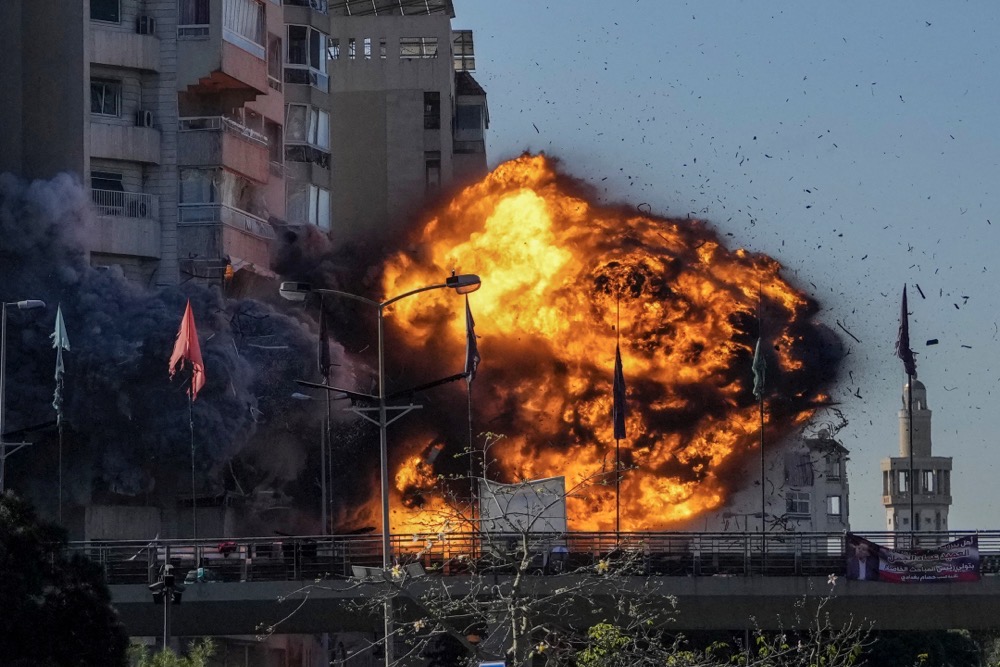BEIRUT: Peace and development in the Middle East is contingent upon an Israeli withdrawal from Gaza and the Lebanese border, Lebanon’s prime minister has said.
Caretaker Prime Minister Najib Mikati, addressing the Arab Forum for Sustainable Development at the UN House in Beirut on Tuesday, called on Israel to abide by international edicts, including Resolution 1701.
He said that sustainable development and peace in the region “requires stopping the Israeli aggression against southern Lebanon and Gaza and moving toward the peaceful option.”
Mikati added: “The situation poses great pressure on Lebanon and necessitates raising our voice to urge the international community to stop what is happening, deter the Israeli enemy, and work to provide peaceful solutions to the region’s problems.”
He described the Palestinian cause as the “foremost” issue, adding that its “flame has not been extinguished” despite Israeli measures to “suppress it through killing, destruction and annihilation.”
The prime minister’s comments came a day after US envoy Amos Hochstein visited Lebanon and Tel Aviv.
During talks in Beirut, Hochstein warned that there is “no such thing as a limited war,” urging Hezbollah and Israel to avoid an escalation of violence that “is in no one’s interests.”
A diplomatic solution is the only way to resolve the 150-day limited conflict on Lebanon’s southern border, he added.
Any deal must enforce stability on both sides of the border and safeguard the return of displaced people in Lebanon and Israel, Hochstein said.
The day after the envoy’s visit, the head of the Hezbollah parliamentary bloc, MP Mohammed Raad, renewed his party’s position on the violence in the south.
Hezbollah “does not wish for war, nor does it seek it, but we are ready to confront it,” Raad said.
He added: “We are ready to confront the enemy if it miscalculates and seeks to deviate from the rules of deterrence that we have imposed on it.
“But, so far, we have been waiting so as to spare our country and our people the consequences of an open war in which there will be blood and losses — but the biggest and strategic loser will be the Zionist enemy.”
Raad said that Hezbollah is operating “according to precise calculations” and still maintains a considerable arsenal to fight Israel.
“We have not used all of our weapons, and we are yet to open the warehouses of the weapons of open war, and the enemy knows that,” he added.
The US plan for a settlement, relayed by Hochstein in Beirut and Tel Aviv, includes several conditions, the foremost of which being an immediate end to hostilities.
Washington also calls for Hezbollah’s withdrawal from south of the Litani River, a reinforcement of UNIFIL and Lebanese Army forces in the region, and the return of evacuated Israeli and Lebanese civilians to border settlements.
A second proposed phase will see negotiations between the Lebanese state and Israel to define land borders and resolve disputes over occupied zones in the Shebaa Farms and Kafr Shuba heights areas.
In 2022, Hochstein mediated indirect negotiations between Lebanon and Israel to demarcate maritime borders.
On Monday, he also met top officials in the Israeli government. Israeli Channel 12 highlighted “encouraging signs and initial indications” during Hochstein’s talks in Lebanon, raising hopes of a diplomatic solution to the hostilities.
The channel claimed that Hezbollah may have given tacit approval for further diplomatic efforts toward a settlement.
A TV report said Hochstein had discussed Washington’s plan for resolving the issue with Israeli officials, but was rebuffed.
He was told that Israel will continue military operations in southern Lebanon “until an agreement is reached to return about 90,000 Israelis to their homes,” the report added.
Israeli Security Minister Yoav Gallant said after meeting Hochstein: “Our commitment to our citizens is greater than any other commitment. We are ready to resolve the crisis politically, but we are also prepared for all eventualities.”
Meanwhile, Hezbollah and Israel continued to trade strikes on the southern border.
The Lebanese militia said its fighters had destroyed an Israeli Merkava tank in the Natua settlement using a guided missile, injuring or killing its crew.
Hezbollah also attacked military sites in Israel’s Barkat Risha and Al-Raheb.
On Monday night, Israeli jets shelled the border town of Al-Adisa, targeting a Hezbollah-affiliated Islamic Health Authority center, killing three volunteer paramedics.
Israel also struck Al-Sultaniya and Siddiqin, causing minor injuries to some residents and significant destruction to vehicles and properties.


































